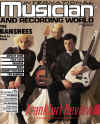
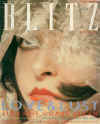
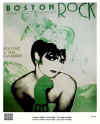
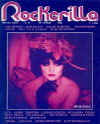
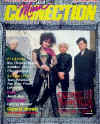
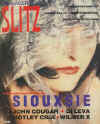
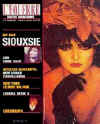
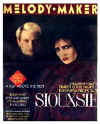
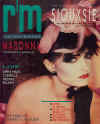
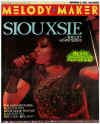
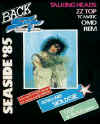
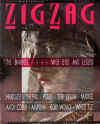
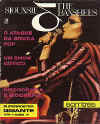
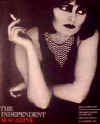
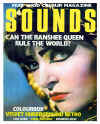
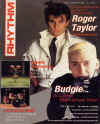

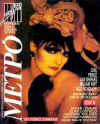
| TINDERBOX - MAGAZINE COVERS | ||
|
|
||
|
|
||



 


 






 

|
||
| NME | ||
|
|
||
|
|
||
|
The Sweetest Chill
Just when you thought it was safe to go out at night again, SIOUXSIE AND THE BANSHEES return. Smarting with fury after their 'Hyaena' was sent packing, their new discipline will not permit listeners the same leeway this time round. What? Me happy? Mind your own business! Last Wednesday Greta Garbo celebrated her 80th birthday. Despite 50 years of Hollywood prying, her divinity, her mysteries remain intact. A remarkable achievement. Her person stands inviolate, or at least as undefiled as she desires. This September Siouxsie & The Banshees turned nine years old. These past few years they have not proven as resistant to the snoops and personality collectors as Garbo, in all her self-imposed solitude, has managed. The fabulous frieze the Banshees used to present has been nigglingly chipped away by souvenir hunters and well wishers - strangely, their enemies never did them any real harm - until it was flattened out, rendered one dimensionally flush, just like the shriller Banshee haters always said it was. If the Banshees' record looks poor in comparison, it should be pointed out they work within a more vicious, spiteful, vulturous and impatient popular culture, which sells an altogether baser idea of star. The Banshees always stated their intention to pursue stardom. Indeed, they rightly declared themselves stars before any recognised system acknowledged them as such. That they disdainfully cackled in the face of the media's late acceptance of them served to fortify their star myth. They intuitively knew they had it - they didn't need anybody telling them back then. But something got lost in the way of the Banshees' cold resolve. Those long term Banshee watchers amongst us looked on in horror as the group seemed to become slowly absorbed into the anecdotal chum structure of the music press supporting the pop star system, which reciprocated with gossipy features showing that even Siouxsie could be one of the lads, and, boy, could the Banshees party. In short, they were no different from the rest of us. This was the revelation we did not need to be told. The debilitating process of such amiable articles on their lofty indifference to adoration - paradoxically they were then presented by the same media as suitable candidates for worship - certainly made them less remote. The more that was shown of them, all these intimate little mask-slip glimpses we were afforded of the Banshees at work and play, suggested they were less in control than they claimed. Now, the Banshee notion of stardom was never an act of self-elevation, certainly not a matter of them presenting themselves as objects for examination. It was their way of defining and preserving the essence that marked them out from the rest of the herd, of keeping others from encroaching on their space. But, not bored with them yet, the media wouldn't let them go. The more the amiable buffoons buffeted Siouxsie's blackness, believing themselves to be doing the group the favour of rescuing them from the cold, the more they exposed the fallacy of their own undertaking. The myth of Sioux doesn't so easily fall away, though until their recent European hibernation it had become somewhat tarnished by over-familiarity. Luckily, the Banshees - namely Sioux and Steve Severin, Budgie and latest guitarist John Carruthers - have phenomenal recuperative powers. For the followers' part, they did not require any stagey friendliness from the Banshees. They certainly weren't after some icon to venerate. They were offered a greater and very real intimacy: the essence of Siouxsie & The Banshees poured into performance and records. Hippy? GO shove it! Gaze across at the face of Siouxsie Sioux opposite. Now tell me, is there anything more you need to know about her? Suffice it to say, the baubles have been cleared out with the babble, gone with the gaggle of geese establishing their pecking orders elsewhere. Their attention span didn't stretch to the Banshees' silence. After a year away, a summer spent working on a new LP in Berlin and a tour of out of the way places across the continent, the Banshees returned a renewed and thereby invigorating force. No radical departures, they have relocated their capacity to surprise, stir and even motivate. "Something you brought up in your Belgian review (from the costal resort town of De Panne), " recalls Siouxsie, as we cast ourselves adrift in the tourists of Queensway, packing back and forth between a German Konditorei and two deckchairs in Hyde Park, enjoying - Sioux, that is - the anonymity of being amongst foreigners. "You said we played a lot of new songs that sounded like the older ones. Well, they do, I suppose. There's no denying that the Banshees have a sound, whether we're using guitars or stringed instruments, no matter what we're playing it comes out sounding recognisably Banshees. We do not want to make ourselves sound different just for the sake of it." Their new songs make room to move within the narrow parameters of the Banshees style. Sunk in deckchairs, watching the sun go down over London, Siouxsie plays me their forthcoming single 'Cities In Dust', inspired by a visit to Pompeii during the Italian tour. Budgie's clatter of percussion provides a turbulent expression of the earth spewing forth it's pestilences, while guitar and bass inscribe a laced rhythm/melody with the churning fear of the inhabitants, combined with a quizzical awe at suddenly being placed at the mercy of natural forces. And Siouxsie's lyric is the free-frame of a city petrified for all eternity, it's distraught citizens final seconds, spent nobly or otherwise, here preserved for all to see. As with Siouxsie's best work it places the concrete reality of the event in opposition to the way we are invited to see it now, contrasting the view presented to the tourist - "It's really awesome, but at the same time quite sad," she elaborates, "dusty bodies, an empire buried in dust; brats have graffiti-ed the wall, while their parents have to be reminded what to do with their litter, before-and-after bootleg books on sale outside..." - and her imaginative reconstruction of the catastrophe. Destruction on such scale, natural or otherwise, echoes through the ages, particularly in the 20th Century, which has endowed man with the ability to outdo nature in damage. "If there were to be a wipe out, I think I would like it to be something natural," posits Sioux "It's good to know we can be obliterated without all the nuclear hysterics. That's quite healthy in a perverse way, in that it shows there is no ultimate power really, we are mere mortals after all. I'd rather be washed away in the tidal waves than by the whim of some far removed person. But I don't think that'll happen anyway." Closer to home, Siouxsie's concerns rarely touch on massive fears, Instead she pinpoints with unerring accuracy those that really get the skin prickling. The Banshees have never bowed to the twin fears proposed by pugilist author Norman Mailer in his absorbing biography of the existential hipster The White Negro (from Advertisements For Myself, Panther) - they being the atom bomb and the dark shadow thrown across western culture by the concentration camps. It's critics have accused him, not altogether unfairly, of harnessing catastrophic concerns to render his design for resistance all the more heroic. The comment could also be applied to some contemporary big issue bombardiers like Weller and Bragg. The common myth-take about Siouxsie & The Banshees' reputedly morbid fascinations originates in a very basic misunderstanding. Theirs is not a horror of death. Its is a horror of being, to which death sometimes comes as a comforting close. "We are talking about horror in the broadest sense," Siouxsie cautions, "so it could include something like incest. Otherwise it degenerates into a generalisation I don't like about the Banshees and that's horror in the narrow sense of schlock, eyeballs, brains, the offal factor..." Broad it is, but that doesn't preclude the narrowing of focus to scan the string-snap precipitating breakdown in an early song 'Suburban Relapse'. This was, and is, the power of Siouxsie's horror: it brilliantly illuminates an individual fearfully suspended in one's own living space, one's own hole, one's own body. This is all one is left with, and it's slowly being eroded by the outside. One's defences slip away, leaving one prone to the daily bombardment of image, voice, touch, making claims, demanding love, refusing to leave one alone with all that she has got left - one's self. Normally, of course, one copes with it all quite easily as part of the run of things. Then that day comes when one is caught offguard, equilibrium out-of-kilter, and one is in no condition to prevent that multiplicity of cells starting work on the irreversible deterioration of the self. Or, there's always waking up to the true nature of one's normal circumstances and being horrified by the sight. "... That's too close for me to talk about," Siouxsie lets slip. "I mean... I do feel totally disgusted with the world quite a lot of the time... horrified and frustrated... well not so much at things that go on in the world, but things that happen to individuals rather than a whole population, the plight of something being done to someone, to a much smaller number, like just one." The danger of body counts is they become just so many statistics. "Unfortunately yeah. But of course people are different. Some people are moved to do something if they see thousands of people starving rather than just one family hungry down the street or across the hall." A good or great Banshees song is highly attuned to the effects of horror, be it one inspired by events or, simply, the terror of just being. The Banshees might not deal out dole queue politics, but they have registered the despair of negotiating endless dimlit pale green corridors, be they in hospitals, mortuaries or office mazes. They have also, of course, recorded the feats of modern heroes and heroines, who have overcome this horror of being, or perhaps have converted it into revolt into being, accepting their horror as their own, the thing that allows them the right to be. Elsewhere, in 'Fireworks' and parts of 'Kiss In The Dreamhouse' they've suggested sensual pleasures worth living for. Just once did they let slip their invaluably tight grip of their own reality, when during the writing of 'Hyaena' Siouxsie and Steve Severin seemed to maroon themselves on a nightmare cornmash of video nasties. "Oooh," smarts Siouxsie. "Well, yes, that period we did go through a phase of watching a lot of video nasties, a warped period of staying up quite a few nights a week just watching the things. I'd just bought a video machine, that was three years ago, and everybody I knew seemed to be, like, in a video nasty club. I mean, there was a lot of unreality, waking up to video images. A song like 'We Hunger' arose out of that environment. I wasn't really living with any subtlety then." Apart from 'Dazzle', a majestic noise sculpture, rolling on a rhythm lumbering out of control, most of 'Hyaena' felt like the pair had succumbed to the bludgeoning of their chosen viewing. Guitarist Robert Smith's imminent departure undoubtedly contributed to it's unsettled and half finished nature. Not only did the LP succumb to the bludgeoning, it follows that it contributed to the same. The Banshees seemed trapped in a mental landscape from which few report back. At some point during the Banshees' travels, however, Siouxsie, Budgie and Steve got to grips with the precious thing sliding away from them. Perhaps sixth Banshee guitarist John Carruthers reminded them of what they once had. The set they've been trailing around Europe proves they've reinvented that distinct sensibility. Though at the Belgian festival where I saw them, the cold usually got to me before the frisson, half remembered tunes still haunt. The Banshees have around a dozen to draw upon when they tour Britain next month. Due to a split with their producer Huw Jones, the LP many will eventually turn up on isn't due out till the New Year. Without a record to promote, the tour serves as a throwback to Siouxsie and Steve's pre-signed days, when they struck towns up and down Britain with an alien, bordering atonal rhythm noise, for which there was no real gauge or precedent. The remembered experience still informs Banshees concerts. This has nothing to do with nostalgia - more delayed shock. Given a high proportion of unheard material, it might be useful to outline some song themes. Sioux: 'Cannon': "It was inspired by seeing a book programme about T. S. Eliot. I think it was. And it touched upon this freak weather period in the 20's, when it was either incredibly hot and oppressive or ridiculously cold when it shouldn't have been. Apparently, in desperation about what to do a cannon was shot into this oppressive sky every night in the hope of bursting a rain cloud. The image of this deserted town, with someone having to stay behind to fire the cannon, stuck with me." 'This Unrest': "The title is self explanatory. Not this unrest within society, but within oneself." 'Sweetest Chill': "It touches on the death of a loved one, being touched by the chill of their presence..." 'Parties Fall': "It's a slightly sad story about people dressing up all day to go out at nights. And that's all they do... The parties spoil perhaps when you get too old to do it." '92 Degrees': "That was sparked off by a short story I read where crimes would escalate when the temperature reached 92 degrees. It's about the rising panic of the people who know what's going to happen as the temperature rises towards that number. I mentioned it to Steve, who'd seen some alien from outer space film, in which, right at the end, a sheriff says: 'Yeah, just about at this temperature everybody goes crazy'." There is little room for cheap emotion in the Banshees' schema. Sentiment is misleading, it runs tears that discolour and distract the listener from the song proper. Due to misunderstandings dating back to 'Love In A Void' Siouxsie, subconsciously or otherwise, has since mostly written in the third person, her neat, telling stories declaimed in a style intended to distance the singer from the situation she is describing. Thus she avoids any possible confusion of her identity with those of the characters she is speaking through. The song is presented to the audience without excess mystification. This is probably what Siouxsie intending by proclaiming herself a star. The status doesn't furnish her with the excuse to pontificate or condescend to an audience: it is to bring the Banshee art right up to the spectator, while retaining her privacy. Again, the need to maintain some distance can partly be traced back to the experience of 'Love In Void'. Its notoriety inevitably means it is nosily requested. "I hate the rabble rouser element in the song," remarks Sioux vehemently. "I just don't like hearing lots of voices roaring their approval. Sometimes, I'm told we're cruel because we don't encourage that camaraderie spirit. But I feel if we did - feel the need to perform and be one with the audience and that awful myth - the audience would really despise you for it." After all these years, and despite all the temptations, Siouxsie & The Banshees still resist the easy route to ready acceptance. They've managed to rip/breach the massive sponge of the popular sphere, which soaks up anything squeezed up against it, normally allowing for no diversity, though it will entertain the conceits of those ironic subversives so long as it takes to blot them, before seeping the lot back soapy clean and thereby compatible with the prevailing social order. Within the sound they've rent in the sponge the Banshees are a rare instance these days of a group willing to goad its disintegration. After nine years, however, an unavoidable familiarity makes it easy to undervalue their largely consistent vitality. Before immersing myself in this investigation I'd about given up on them, too, disheartened by the mess of 'Hyaena'. But some whimsical sense of duty prompted me to plot a faultline through hitherto ignored B-sides. Some have already been fully incorporated into the Banshees canon - 'Voices', 'Pulled To Bits', 'Red Over White' - others display an adventurousness easily missed by just skimming the A-sides. A song like 'Tattoo', for instance, outlines a bizarre sensual obsession far more precisely and engagingly than the Bruce Dern picture of the same title. Previously lulled by a sense of familiarity into lazily dismissing Siouxsie & The Banshees as past it; these sides shocked me into listening again. "I suppose," sighs Siouxsie early on, pressured (like no other established group) into justifying the Banshees continuing existence. "I suppose being accepted to me is like being buried. And, regardless of what the Banshees are, after nine years, it is inevitable that we're tolerated. Coming to terms with that is pretty horrifying. There's a certain amount of what some people term as being respected - they've done the full whack - which comes with the age of the group, and I find that nauseous." Any burial yet is decidedly premature. Their true level of mainstream acceptance doesn't amount to enough dead leaves and dirt to rake over the shallowest of graves. Don't turn your back on the Banshees yet, otherwise that grave might well end up yours. Biba Kopf 28/09/85 |
||
| NME | ||
|
|
||
|
|
||
|
PORTRAIT OF THE ARTIST AS A
CONSUMER
STEVE SEVERIN (THE BANSHEES) A is for... Absinthe - Arsenic -
Anguish - Aztecs 1985 |
||